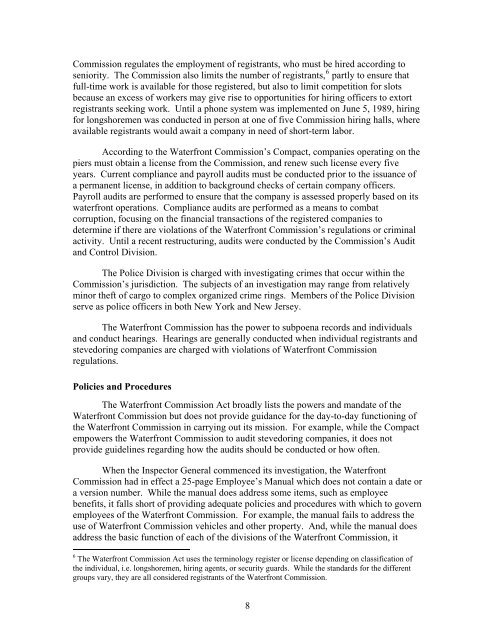Investigation of the Waterfront Commission of New York Harbor
Investigation of the Waterfront Commission of New York Harbor
Investigation of the Waterfront Commission of New York Harbor
Create successful ePaper yourself
Turn your PDF publications into a flip-book with our unique Google optimized e-Paper software.
<strong>Commission</strong> regulates <strong>the</strong> employment <strong>of</strong> registrants, who must be hired according toseniority. The <strong>Commission</strong> also limits <strong>the</strong> number <strong>of</strong> registrants, 6 partly to ensure thatfull-time work is available for those registered, but also to limit competition for slotsbecause an excess <strong>of</strong> workers may give rise to opportunities for hiring <strong>of</strong>ficers to extortregistrants seeking work. Until a phone system was implemented on June 5, 1989, hiringfor longshoremen was conducted in person at one <strong>of</strong> five <strong>Commission</strong> hiring halls, whereavailable registrants would await a company in need <strong>of</strong> short-term labor.According to <strong>the</strong> <strong>Waterfront</strong> <strong>Commission</strong>’s Compact, companies operating on <strong>the</strong>piers must obtain a license from <strong>the</strong> <strong>Commission</strong>, and renew such license every fiveyears. Current compliance and payroll audits must be conducted prior to <strong>the</strong> issuance <strong>of</strong>a permanent license, in addition to background checks <strong>of</strong> certain company <strong>of</strong>ficers.Payroll audits are performed to ensure that <strong>the</strong> company is assessed properly based on itswaterfront operations. Compliance audits are performed as a means to combatcorruption, focusing on <strong>the</strong> financial transactions <strong>of</strong> <strong>the</strong> registered companies todetermine if <strong>the</strong>re are violations <strong>of</strong> <strong>the</strong> <strong>Waterfront</strong> <strong>Commission</strong>’s regulations or criminalactivity. Until a recent restructuring, audits were conducted by <strong>the</strong> <strong>Commission</strong>’s Auditand Control Division.The Police Division is charged with investigating crimes that occur within <strong>the</strong><strong>Commission</strong>’s jurisdiction. The subjects <strong>of</strong> an investigation may range from relativelyminor <strong>the</strong>ft <strong>of</strong> cargo to complex organized crime rings. Members <strong>of</strong> <strong>the</strong> Police Divisionserve as police <strong>of</strong>ficers in both <strong>New</strong> <strong>York</strong> and <strong>New</strong> Jersey.The <strong>Waterfront</strong> <strong>Commission</strong> has <strong>the</strong> power to subpoena records and individualsand conduct hearings. Hearings are generally conducted when individual registrants andstevedoring companies are charged with violations <strong>of</strong> <strong>Waterfront</strong> <strong>Commission</strong>regulations.Policies and ProceduresThe <strong>Waterfront</strong> <strong>Commission</strong> Act broadly lists <strong>the</strong> powers and mandate <strong>of</strong> <strong>the</strong><strong>Waterfront</strong> <strong>Commission</strong> but does not provide guidance for <strong>the</strong> day-to-day functioning <strong>of</strong><strong>the</strong> <strong>Waterfront</strong> <strong>Commission</strong> in carrying out its mission. For example, while <strong>the</strong> Compactempowers <strong>the</strong> <strong>Waterfront</strong> <strong>Commission</strong> to audit stevedoring companies, it does notprovide guidelines regarding how <strong>the</strong> audits should be conducted or how <strong>of</strong>ten.When <strong>the</strong> Inspector General commenced its investigation, <strong>the</strong> <strong>Waterfront</strong><strong>Commission</strong> had in effect a 25-page Employee’s Manual which does not contain a date ora version number. While <strong>the</strong> manual does address some items, such as employeebenefits, it falls short <strong>of</strong> providing adequate policies and procedures with which to governemployees <strong>of</strong> <strong>the</strong> <strong>Waterfront</strong> <strong>Commission</strong>. For example, <strong>the</strong> manual fails to address <strong>the</strong>use <strong>of</strong> <strong>Waterfront</strong> <strong>Commission</strong> vehicles and o<strong>the</strong>r property. And, while <strong>the</strong> manual doesaddress <strong>the</strong> basic function <strong>of</strong> each <strong>of</strong> <strong>the</strong> divisions <strong>of</strong> <strong>the</strong> <strong>Waterfront</strong> <strong>Commission</strong>, it6 The <strong>Waterfront</strong> <strong>Commission</strong> Act uses <strong>the</strong> terminology register or license depending on classification <strong>of</strong><strong>the</strong> individual, i.e. longshoremen, hiring agents, or security guards. While <strong>the</strong> standards for <strong>the</strong> differentgroups vary, <strong>the</strong>y are all considered registrants <strong>of</strong> <strong>the</strong> <strong>Waterfront</strong> <strong>Commission</strong>.8


